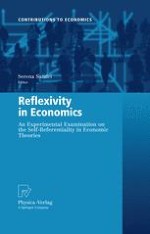2009 | Buch
Über dieses Buch
Since the individuals are not just stimulus-response machines but more complex beings that think and are simultaneously conscious of their thought, re?exivity is potentially involved in all human acts of cognition and in all conceptualizations. On this basis, each human discourse can be characterized as a way of thought f- mulation and therefore, reveals a self-referring nature. On this level of re?exivity, the individual thought shapes beliefs and mental representations which give life to mental models and strive to predict future events and developments to support the individuals in their decision-making. Such mental models are re?ected by the - dividuals themselves and on the situation they are confronted with. According to the result of this recursive application, the individuals will then decide which model they want to refer to, or in other words, which model they want to absorb. Similarly, the individuals can make use of social theories and predictions which can therefore yield recursive effects and interfere with the phenomena they aim to depict. Revealed theories, if accepted, may in?uence the behaviour or the agents they focus on, either in the sense of validation of the theoretical content or in that of its rejection.
Anzeige
